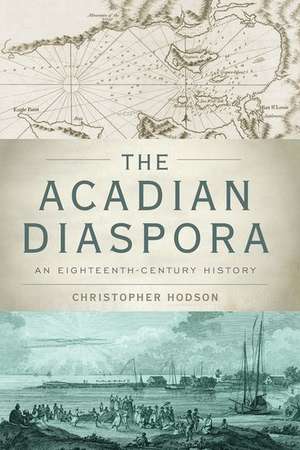The Acadian Diaspora: An Eighteenth-Century History: Oxford Studies in International History
Autor Christopher Hodsonen Limba Engleză Paperback – 13 apr 2017
| Toate formatele și edițiile | Preț | Express |
|---|---|---|
| Paperback (1) | 225.97 lei 31-37 zile | |
| Oxford University Press – 13 apr 2017 | 225.97 lei 31-37 zile | |
| Hardback (1) | 343.11 lei 31-37 zile | |
| Oxford University Press – 31 mai 2012 | 343.11 lei 31-37 zile |
Preț: 225.97 lei
Preț vechi: 254.31 lei
-11% Nou
Puncte Express: 339
Preț estimativ în valută:
43.25€ • 44.98$ • 35.70£
43.25€ • 44.98$ • 35.70£
Carte tipărită la comandă
Livrare economică 03-09 aprilie
Preluare comenzi: 021 569.72.76
Specificații
ISBN-13: 9780190610739
ISBN-10: 0190610735
Pagini: 274
Ilustrații: 20 illus.
Dimensiuni: 155 x 231 x 18 mm
Greutate: 0.41 kg
Editura: Oxford University Press
Colecția OUP USA
Seria Oxford Studies in International History
Locul publicării:New York, United States
ISBN-10: 0190610735
Pagini: 274
Ilustrații: 20 illus.
Dimensiuni: 155 x 231 x 18 mm
Greutate: 0.41 kg
Editura: Oxford University Press
Colecția OUP USA
Seria Oxford Studies in International History
Locul publicării:New York, United States
Recenzii
[A] welcome addition to the growing field of French Atlantic history on at least two fronts. ... [A] brilliant marriage of the day-to-day microworld of Acadians forced to make choices across space and time and the macrodynamics of imperial experimentation over three decades.
Hodson's thorough research takes him through a vast archive of documents... Recommended.
Engaging.... The key themes that emerge from of this study are, first, the disorganization and unreality of imperial dreams in the eighteenth century and, second, the price that a vulnerable population whose members had flourished for decades in the interstices of two empires paid when imperial gambles trumped the family and cultural ties that bound them together.
The Acadian Diaspora is a fine debut performance by a young historian of rare sensitivity and talent. Christopher Hodson has taken a long-familiar episode
A wondrous journey, luminously told, The Acadian Diaspora invites readers into the social and cultural richness of the French Atlantic. Through stories of exiles, migrants, and seekers, Hodson reconfigures our understanding of empire and analyzes the conjoined creation of American and European eighteenth-century worlds.
Hodson is a superb ironist. The Acadian story will never look the same again. But then neither will that of the French Empire: its brutally consequential entanglements with Enlightenment thought wrecked peasant lives long after the initial deportations by the British.
Christopher Hodson movingly tells the stories of the Acadian exiles who scattered all over the Atlantic world after British forces expelled them from their homes in 1755. But his book also reveals tells a much broader tale about eighteenth-century utopian schemes. With wit and humanity, he traces how Acadians became the objects
I would recommend this well written and researched book. It gives a fine narrative account of an important aspect of North American history and describes the plight of a significant Catholic population.
An extremely compelling and valuable contribution to both cultural studies and imperial history Will be of particular interest to those researching the francophone Atlantic world.
The first academic book to cover the wide diaspora across the transatlantic world of the later 18th century into the early 19th century in scrupulous concrete detail.
A decade of research has netted fresh archival material and important insights into the ordeal of Acadians transplanted to the southern American colonies, the French coastal island of Belle-Île-en-Mer, and other locales.
This book tells the familiar story of the Acadian experience of deportation and exile with a new focus . [It] weaves a comprehensive narrative that provokes a reconsideration of the importance of colonial ventures in late eighteenth-century France as well as sympathy for the refugees whose lives were further wrecked by those ventures' failures.
This engagingly written and excellently researched study is the first to explore fully the Acadians' role in the reconstruction of French imperialism after the end of the Seven Years' War in 1763... The Acadian Diaspora ensures that the Acadians can no longer be seen in essence as mere victims of imperial cruelty.... Hodson shows instead they were energetic and canny actors who survived against tremendous odds on the cutting edge of French Enlightenment agricultural experimentation. It is this emphasis on Enlightenment experimentation that marks this return to the best tradition of grand and erudite imperial history as a quintessentially 'Eighteenth Century History.'
Hodson's thorough research takes him through a vast archive of documents... Recommended.
Engaging.... The key themes that emerge from of this study are, first, the disorganization and unreality of imperial dreams in the eighteenth century and, second, the price that a vulnerable population whose members had flourished for decades in the interstices of two empires paid when imperial gambles trumped the family and cultural ties that bound them together.
The Acadian Diaspora is a fine debut performance by a young historian of rare sensitivity and talent. Christopher Hodson has taken a long-familiar episode
A wondrous journey, luminously told, The Acadian Diaspora invites readers into the social and cultural richness of the French Atlantic. Through stories of exiles, migrants, and seekers, Hodson reconfigures our understanding of empire and analyzes the conjoined creation of American and European eighteenth-century worlds.
Hodson is a superb ironist. The Acadian story will never look the same again. But then neither will that of the French Empire: its brutally consequential entanglements with Enlightenment thought wrecked peasant lives long after the initial deportations by the British.
Christopher Hodson movingly tells the stories of the Acadian exiles who scattered all over the Atlantic world after British forces expelled them from their homes in 1755. But his book also reveals tells a much broader tale about eighteenth-century utopian schemes. With wit and humanity, he traces how Acadians became the objects
I would recommend this well written and researched book. It gives a fine narrative account of an important aspect of North American history and describes the plight of a significant Catholic population.
An extremely compelling and valuable contribution to both cultural studies and imperial history Will be of particular interest to those researching the francophone Atlantic world.
The first academic book to cover the wide diaspora across the transatlantic world of the later 18th century into the early 19th century in scrupulous concrete detail.
A decade of research has netted fresh archival material and important insights into the ordeal of Acadians transplanted to the southern American colonies, the French coastal island of Belle-Île-en-Mer, and other locales.
This book tells the familiar story of the Acadian experience of deportation and exile with a new focus . [It] weaves a comprehensive narrative that provokes a reconsideration of the importance of colonial ventures in late eighteenth-century France as well as sympathy for the refugees whose lives were further wrecked by those ventures' failures.
This engagingly written and excellently researched study is the first to explore fully the Acadians' role in the reconstruction of French imperialism after the end of the Seven Years' War in 1763... The Acadian Diaspora ensures that the Acadians can no longer be seen in essence as mere victims of imperial cruelty.... Hodson shows instead they were energetic and canny actors who survived against tremendous odds on the cutting edge of French Enlightenment agricultural experimentation. It is this emphasis on Enlightenment experimentation that marks this return to the best tradition of grand and erudite imperial history as a quintessentially 'Eighteenth Century History.'
Notă biografică
Christopher Hodson is Assistant Professor of History at Brigham Young University.


























